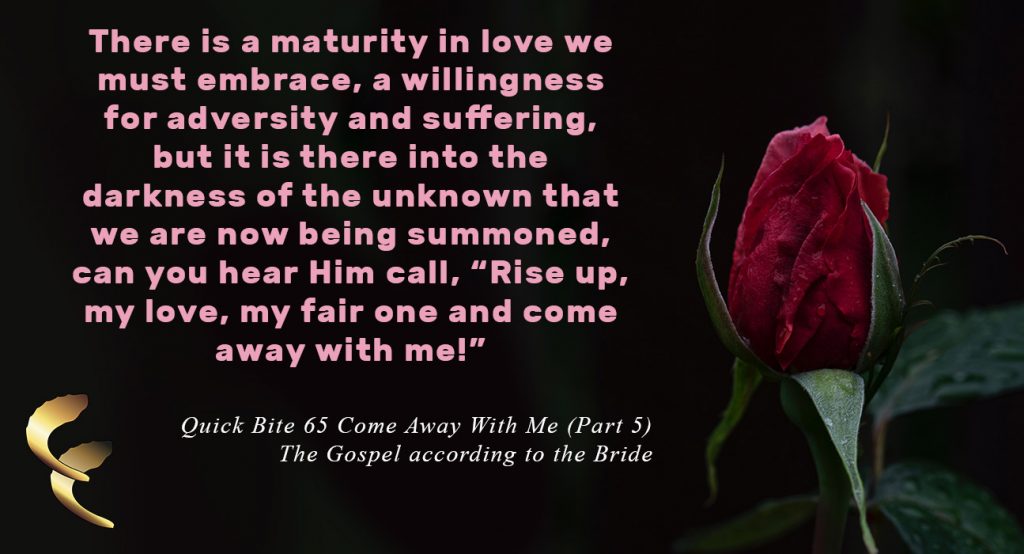Have you ever had a special night planned with someone you love and it didn’t work out the way you expected? Or ever said to yourself ‘Well, that didn’t go as I had imagined’ when a dream you’ve had for a while took a different turn? In this Quick Bite, we’re going to look at when this happened to the Shulamite in Song of Songs as a continuation in the “Come Away With Me” series. So Here’s our key text again in Song of Songs.
2 [The Shulamite] I sleep, but my heart is awake; [It is] the voice of my beloved! He knocks, [saying], “Open for (to) me, my sister, my love, My dove, my perfect one; For my head is covered with dew, My locks with the drops of the night.” 3 I have taken off my robe; How can I put it on [again]? I have washed my feet; How can I defile them? 4 My beloved put his hand By the latch [of the door], And my heart yearned for him. 5 I arose to open for my beloved, And my hands dripped [with] myrrh, My fingers with liquid myrrh, On the handles of the lock. 6 I opened for (to) my beloved, But my beloved had turned away [and] was gone. My heart leaped up when he spoke. I sought him, but I could not find him; I called him, but he gave me no answer. 7 The watchmen who went about the city found me. They struck me, they wounded me; The keepers of the walls Took my veil away from me. – Song of Songs 5:2-7 NKJV
The Song of Songs is a rich, passionate, yet mysterious account of how the love relationship between two people developed at the time of King Solomon’s reign. However we’re not studying this from the literal historical context (which I plan to come back to another time), rather, we’re drawing out of the text the applicable parallels as they relate to us in our relationship with Jesus. From this point on therefore, I’m going to refer to the Shulamite as the Bride, and the Beloved as the Bridegroom. The context here, is that the Bride is deeply in love with the Bridegroom, and longs to be with him. She cannot stop thinking about him, even at night, although she sleeps, her heart is awake dreaming of him, and then one night in particular she hears him approach and knock on the door. This is the moment she has been waiting for. Remember, she is sick with love, her heart yearning and faint, then finally her Beloved has come and asks her to open to him. But is this really the moment she has longed for? I ask because her response is a curious one, and immediately suggests something is not quite right. Listen to her words in verse three “I have taken off my robe; How can I put it on [again]? I have washed my feet; How can I defile them? “. That’s a strange reply, isn’t it? Personally, I find it hard to accept the commentators view I have read on this verse who each see this as revealing the Bride’s reluctancy to get out of bed, or a delayed response to the Bridegroom’s visit, and suggesting this is why there was no one outside when she did finally open the door to him. Now far be it from me to dismiss what others have said on this, especially since Song of Songs lends itself to many interpretations, instead I’ll just offer my own understanding here and let you decide, it’s one in which I believe is consistent with the context and flow of the Song of Songs narrative.
As I’ve mentioned, I do struggle reconciling the besotted love-sick Bride being reluctant to get out of bed or move so slowly the Bridegroom simply gave up waiting for her. I suggest this was not about her reluctancy to be with the One her soul loved, but where she wanted their encounter to be and the nature of it. What do I mean by that? Well, I suspect when the Bridegroom came, there was something troubling in what he said to her. He was stood outside her door covered with dew and the drops of the night saying “open for me”, other translations have “open to me” here. But it wasn’t just what he said, but the impact it had on her. We read of this later in verse six “My heart leaped up when he spoke.” The word for leaped is H3318 (yāṣā’) and means to go out, come out, go forth, and spoke is H1696 (dāḇar) meaning speak, declare, converse, command, promise, warn, threaten or sing. Although a number of translations don’t use either “leaped up” or “spoke” I believe these two words help understand the meaning and context of this whole passage. The NIV and CSB uses “My heart sank”, whilst the NET reads “I fell into despair.” Other translations however do include both these words, like the YLT which says, “My soul went forth when he spake” or the HNV “My heart went out when he spoke”. We have a cause and effect here. The Bridegroom speaks causing the heart of the Bride to go out to him. Ultimately, we will do well not to read too much into a single verse (especially in Song of Songs) rather we need to take the context into account and look at what else is happening, to form a consistent and uniform interpretation which makes sense. That’s why I struggle to accept the Bride’s lethargy in this passage, because we know she was desperately in love with him and longed to be with him. For him to then arrive during the night and be turned away just doesn’t sit right with me. Is there something else from this passage to help us get a grip on what’s taking place here? I believe there is, it’s easy to miss, and we’ve already seen it. The Bride’s response wasn’t just about being naked, but she also said, “I have washed my feet; How can I defile them?” Bible students will be familiar with the custom of washing feet upon entering a home from the dirty, dusty streets outside, but the thought of defiling them within her own home in my opinion is misplaced here. In other words, she understood her Bridegroom was calling her to come outside with him, and that’s why her feet were in danger of being defiled. To me she wasn’t saying come back another time, rather, I’m not dressed to go out with you into the night, I am clean and I’ve taken off my garment, wouldn’t you rather stay here with me?


Dear friends, this is such an important point for us to understand and why I’ve taken some time to unpack this. True intimacy is not ego-centric or a one-sided affair, if that be the case there is a real danger of the Bride becoming narcissistic, but if we really want closeness with Jesus we have to leave the comfort of our making and follow Him out into the night. This is the question the Bride needs to be asking, how can I prepare to follow my Beloved into the night, since I do not know what awaits me there, except for the drops of the night. There is a maturity in love we must embrace, a willingness for adversity and suffering, but it is there into the darkness of the unknown that we are now being summoned, can you hear Him call, “Rise up, my love, my fair one and come away with me!” Like the Shulamite, we may have our own ideas, dreams and visions of how we want our relationship with Jesus to work out, and He is loving enough to come to us, even abide in us, but what of our response to Him? What if that response should require our absolute surrender whatever the cost? Oh yes, how willingly to Him we have opened the door of our hearts allowing access to our deepest parts, are we now as willing to enter the door to the depths of His heart because He is inviting us there? How can we prepare for such an encounter? Well, I’ll answer that next time.






